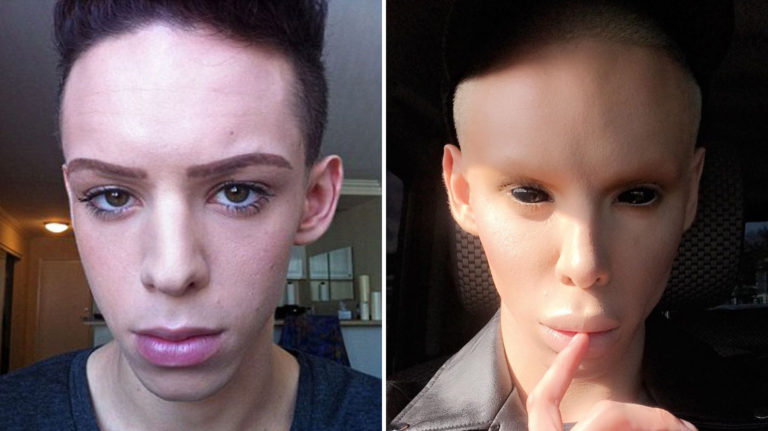Why Do Many Transgender People Decide to Detransition?

Cross-sex hormones are often prescribed without thorough psychological evaluation.
The rise of feminist movements led to the emergence of the theory of "gender," which argues that differences in interests and abilities between men and women are shaped by societal influences rather than biology.
According to this theory, "gender" is a person's psychosocial identity, independent of their biological sex, allowing for a disconnect between physical and psychological identities. Proponents of this theory view "transsexualism" as natural, although the medical community recognizes it as a disorder.
Critics argue that gender theory is based on unfounded hypotheses and has contributed to a surge in transsexualism, particularly among adolescents.
This phenomenon, they say, is linked to social influences and mental health disorders, with recent years seeing a tenfold increase in young people seeking to change their sex, most of them girls.
‘Psychotherapy Over Surgery’
In Western countries, questioning a patient's gender identity is considered a violation of human rights, with dissenting medical professionals facing severe consequences.
As a result, cross-sex hormones and surgeries are often prescribed without thorough psychological evaluation.
Some studies, however, show that 87% of those seeking sex changes also suffer from mental disorders like schizophrenia and personality disorders.
Walt Heyer, who detransitioned 33 years ago, argues that treating these underlying issues could eliminate the desire for sex change, advocating for psychotherapy over surgery.
Studies from the UK and US indicate high rates of self-harm and suicide among transgender individuals, even after surgery, with suicide rates 19 times higher than the general population.
The exact number of people unhappy with their transition is unknown, but detransitioners, those who revert to their biological sex, are growing in number.
They often suffer from irreparable physical and psychological damage but find solace in online communities.
Sinead, 29, sought to transition after traumatic experiences but now regrets the irreversible changes.
She told The Sun that she was Initially pleased with the effects of testosterone, but she later faced depression and alcohol abuse, realizing that transitioning didn’t solve her underlying issues.
Now, she struggles to accept her altered body and hopes to connect with others like her.
Lucy, 23, struggled with body image issues as a teenager, leading to anorexia and eventually, a series of gender surgeries.
Despite undergoing these procedures, she now regrets them, facing early menopause and long-term health complications, The Times reported.
Lucy questions how medical professionals allowed such drastic measures without addressing her eating disorder, sexual orientation, or OCD.

Gender Dysphoria
Thomasin, 20, grew up feeling different from other girls, initially identifying as asexual before deciding she was transgender. She changed her documents and lived as a boy for two and a half years.
However, at 18, as reported by The Times, she began to reconsider when she thought about having children. Grateful now that she didn’t undergo surgery, Thomasin has accepted her female body and her attraction to women.
She believes many women transition due to discomfort with their sexuality, rather than true gender dysphoria.
Charlie Evans, 28, lived as a man for 10 years before detransitioning and sharing her story, which resonated with many others.
This led her to create the Detransition Advocacy Network, helping others navigate the challenges of detransitioning. She notes that many detransitioners are young women, often with autism, who regret their gender reassignment.
Dagny, a young feminist, was influenced by social media to believe she was transgender after feeling confused about puberty.
She joined online LGBT groups and became convinced she was a "trans man." At 22, she no longer wishes to transition and advocates for giving children with gender dysphoria more options.
Her project, involving other detransitioned girls, has helped at least two teens avoid transitioning.
Daily Mail published the story of Keira Bell, 23, who suffered from depression and gender identity issues as a teenager. At 15, she sought help at the Tavistock clinic and was quickly prescribed puberty blockers, followed by testosterone.
After undergoing a mastectomy, Bell immediately regretted her decision. She stopped taking hormones but now lives with the irreversible effects of the treatment, including a deeper voice and a more masculine appearance.

Irreversible Surgeries
Similarly, BBC reported that Ellie, now 21, also regrets her transition. At 15, she questioned her sexuality and gender identity and sought help from trans organizations.
The advice she received focused solely on transitioning to male, which left her feeling unsupported.
Despite initial doubts, Ellie began hormone therapy and underwent surgery, but soon realized transitioning wasn’t the solution for her.
She now faces permanent physical changes, including a low voice and beard, which she finds distressing. Her partner, Nell, 24, who also detransitioned, shares similar regrets about irreversible changes from testosterone therapy.
Natalia, once diagnosed as transgender, avoided surgery due to legal restrictions and ultimately accepted her female identity.
She now advises others against transitioning, highlighting the severe health risks and lack of support for those who regret their decisions. She emphasizes that many who undergo surgery end up deeply dissatisfied, often living as outcasts.
Katie Grace Duncan, after years of living as a man, realized that her transition was a response to trauma, not an authentic expression of identity.
With the help of faith and community, she began to reconnect with her femininity, understanding that her belief in being born in the wrong body was a coping mechanism for her past.
These stories align with concerns raised by the Society for Evidence-based Gender Medicine (SEGM), an international group of clinicians and researchers who argue that the long-term effects of gender reassignment surgery are poorly understood.
Recent reviews by public health authorities in Finland, Sweden, and England suggest that the benefits of such surgeries are unproven and may even be harmful, particularly for young people.
Despite this, transgender activists often ignore evidence that most children with gender dysphoria eventually embrace their biological sex if not encouraged to transition.
Psychiatrist Bob Withers warns that irreversible surgeries should be avoided, advocating for psychological support over physical interventions.
He predicts that in the future, the current approach to gender dysphoria will be seen as one of the darkest chapters in modern medicine.












